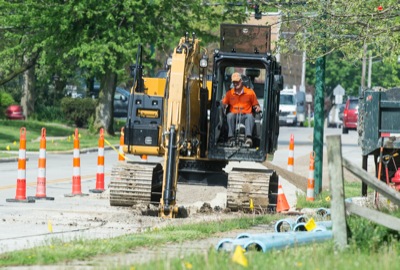Tuesday, May 13th, 2014
Proposed city tax revision moves ahead
By William Kincaid

Photo by Mark Pummell/The Daily Standard
City crews on Monday work on a water line replacement on Wayne Street in Celina. City council is taking steps to place before voters in November an issue to repeal a half percent income tax set aside for police and fire and replace it with a tax that also funds street repairs.
CELINA - City officials are moving ahead with a proposal to repeal a half percent income tax set aside for police and fire capital expenses and replace it with a tax that also funds street repairs.
After months of discussion, council members unanimously passed first reading of a resolution to put a measure on the November ballot to repeal the current half-percent fire and police equipment tax and replace it with one that also funds street repairs. The levy would run for seven years and begin Jan. 1.
The current total income tax rate is 1.5 percent. The half-percent income tax for police and fire capital expenses is in its fourth year. If the ballot issue failed, the city would continue collecting the additional half-percent income tax for another three years.
Because councilmen Myron Buxton and Eric Clausen were absent, council members were unable to suspend the rules for the required three readings and pass the resolution as an emergency.
The resolution will be read again at a special council meeting at 6 p.m. Monday on the second floor of the city administration building on Main Street.
The ballot would expand use of income tax dollars for public right-of-way improvements, including streets, curbs and sidewalks.
Councilman Jeff Larmore emphasized the importance of clear ballot language.
"The word 'additional' kind of stands out to me ... do we have to actually say half-percent additional or can we drop the word 'additional?' " he said. "I don't want to confuse the voter by saying a half-percent additional income tax. I think it should be repeal and replace the half-percent income tax."
"You can't just say the half-percent income tax ... it's really one-and-a-half," council president Jason King said.
Law director George Moore said he would consider rewording the issue for clarity before the special meeting.
With many of the fire department's long-term equipment needs met and income tax collections of $5 million in 2013 - $3.35 million from the 1 percent tax and $1.65 million from the additional half percent tax - Celina Mayor Jeff Hazel has said it's time to ask the public to repeal and replace the half-percent tax.
Celina doesn't have a funding mechanism to address the "horrendous street problem" within the city, Hazel has said.
City auditor Betty Strawn on Monday night revealed that city finances as of the end of April are very strong, with revenue collections at $2.7 million, 39 percent of the total anticipated amount for the year, and expenditures at $2.3 million, 32.8 percent of total anticipated amount.
"At this point, the year is moving along nicely," she said.
Though still early, if the pattern continues, the city is poised to end 2014 with a $3 million carryover, according to Strawn.
"Do you think at a certain point we're carrying over too much money?" councilman Bill Sell asked.
"That would be your decision," Strawn said. "Last year we did create a couple of savings accounts and transferred money from the general fund into those savings accounts. This $3 million, though, it's hard to define how much of this is truly that half a percent that we're going to be talking about tonight, so how much of this can you transfer into a savings account or do you need to keep it in general fund to use it for fire and police?"
Larmore credited the healthy finances to an improving economy and reminded council members that city administrators want to maintain a $2 million reserve.
Councilman June Scott said any unforeseen emergencies would have to be paid from the carryover.
"Our philosophy is not to spend more than we bring in (in) revenue," safety service director Tom Hitchcock said. "So your balance is going to increase every year because we're not going to spend more than what we bring in that year. Now, granted, if there's a major emergency, we have a fund then, that's what that money's for."



